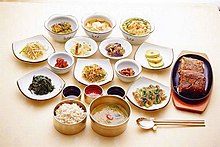
Back Jeotgal German Jeotgal Spanish Csotkal Hungarian Jeotgal ID Jeotgal Italian チョッカル Japanese Jeotgal JV 젓갈 Korean Jeotgal Malay Jeotgal Polish
| Alternative names | Jeot, salted seafood |
|---|---|
| Course | Banchan |
| Place of origin | Korea |
| Associated cuisine | Korean cuisine |
| Main ingredients | Seafood, salt |
| Similar dishes | Shiokara |
| Korean name | |
| Hangul | 젓 / 젓갈 |
|---|---|
| Hanja | (none) |
| Revised Romanization | jeot / jeotgal |
| McCune–Reischauer | chŏt / chŏtkal |
| IPA | [tɕʌt̚] / [tɕʌt̚.k͈al] |
| Liquid jeotgal | |
| Hangul | 액젓 |
| Hanja | 液젓 |
| Revised Romanization | aekjeot |
| McCune–Reischauer | aekchŏt |
| IPA | [ɛk̚.tɕʌt̚] |
 |
| This article is part of a series on |
| Korean cuisine 한국 요리 조선 료리 |
|---|
Jeotgal (Korean: 젓갈) or jeot (젓), translated as salted seafood, is a category of salted preserved dishes made with seafood such as shrimps, oysters, clams, fish, and roe.[1][2][3] Depending on the ingredients, jeotgal can range from flabby, solid pieces to clear, broth-like liquid.
Solid jeotgal are usually eaten as banchan (side dishes). Liquid jeotgal, called aekjeot (액젓) or fish sauce, is popularly used in kimchi seasoning, as well as in various soups and stews (guk, jijimi, jjigae).[4] As a condiment, jeotgal with smaller bits of solid ingredients such as saeu-jeot (shrimp jeotgal) is commonly served as a dipping sauce with pork dishes (bossam, jokbal, samgyeopsal), sundae (Korean sausage), hoe (raw fish), and a number of soups and stews.
- ^ "Jeotgal". Korea Tourism Organization. Archived from the original on 2004-04-23. Archived 2004-04-23 at the Wayback Machine
- ^ "jeotgal" 젓갈 [salted seafood]. Korean–English Learners' Dictionary. National Institute of Korean Language. Retrieved 29 March 2017.
- ^ "jeot" 젓 [salted seafood]. Korean–English Learners' Dictionary. National Institute of Korean Language. Retrieved 29 March 2017.
- ^ "aekjeot" 액젓. Standard Korean Language Dictionary (in Korean). National Institute of Korean Language. Archived from the original on 30 March 2017. Retrieved 29 March 2017.
© MMXXIII Rich X Search. We shall prevail. All rights reserved. Rich X Search

